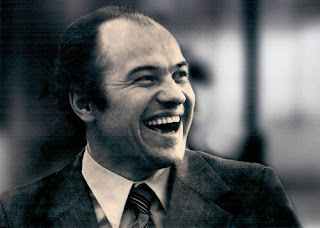May 6 is
Eugen Doga’s mom’s birthday. The Maestro wrote this text a year ago, on May 6, 2015, about his mom.
Eugen Doga fan
Friday, May 6, 2016
Monday, April 25, 2016
In the Mirror of Moments. Part 8.
This note modifies one of the most tragic Doga's songs — A Human
Voice (lyrics by Robert Rozhde-stvensky). This is an antiwar song, an
appeal to people to linger and perceive the wonder of the land. Had the song
been written in an 'alarm' manner, it would not be so impressive. A free
flowing melody is the beauty itself, like our planet, its nature and people on
it with all their love and striving for happiness. The tenderness and delicacy
of the song make it sound like a whisper amidst a chaos, and all this strikes
one much more than loudness of alarm-bells.
Saturday, April 23, 2016
Thursday, April 21, 2016
Wednesday, April 20, 2016
In the Mirror of Moments. Part 5.
Here in Moldavia Doga formed into a composer, moulding his self against
the hardships of life and throughout a long period of artistic growth. And here
he started his unrestrained creative ascent, having cleared himself of all
influences, to become a master of his own theme and vision.
The composer's attitude to his creation does not coincide with the
regard of musical critics depicting him as a man who has established himself at
the apex of his fortune. He would be more willing to compare himself to a small
boy, having climbed up a high tree, tempted by the best fruit at the top. The
ground is far away down, and thin branches are swaying under his weight, and
the fruit are seductive and calling. And there is no way backwards...
Saturday, April 2, 2016
In the Mirror of Moments. Part 4.
And his life did start to gain speed at last. His scooter
broke down in the most inappropriate place — opposite the Opera House. Among a
dozen of idlers, who watched Doga's attempts to make the scooter go, there was
Georgiy Vode, a beginning poet and film-director, as young as Doga himself. He
was agonizingly trying to place the lad's face and at last recognized him as
the author of the songs popular with students. Vode came up to the composer
smeared up with oil and asked if he didn't mind having a go at films.
Friday, April 1, 2016
In the Mirror of Moments. Part 3.
The concert in which N. Chepraga, M. Ivanush and — a beginner then — A.
Lazariuk performed Ye. Doga's songs came to an end. Then there were flowers,
asking for authographs, and Doga, his face helpless and naive, was standing
among this tumult. He was being shot for TV, congratulated by his famous colleagues,
who were telling him something kind and reassuring, touching him by the elbow.
Doga was beginning to be appraised for his ownness, to be assumed as himself.
Subscribe to:
Comments (Atom)





